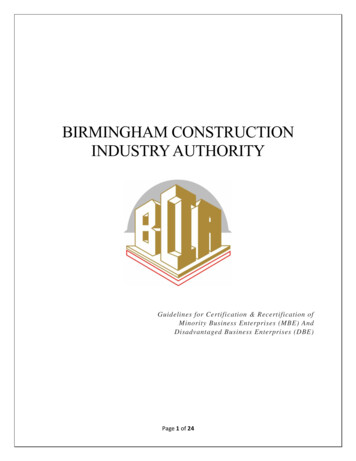
Transcription
BIRMINGHAM CONSTRUCTIONINDUSTRY AUTHORITYGuidelines for Certification & Recertification ofMinority Business Enterprises (MBE) AndDisadvantaged Business Enterprises (DBE)Page 1 of 24
CERTIFICATION ANDRECERTIFICATION OF MBE/DBE FIRMSCERTIFICATION GUIDELINESThe integrity of any MBE/DBE Programdepends, to a large extent, upon theestablishment of systematic procedures to ensurethat only bona fide firms are certified toparticipate in the program. In order to ensureconsistency with the established certificationguidelines, the BCIA has adopted the followingeligibility standards and procedures.Although it is the applicant’s responsibility tosubmit the required information in a notarizeddocument, under penalty of perjury, it is theBCIA’s responsibility to certify that theapplicant’s firm meets the eligibility to standardsset forth. The burden of proof of eligibility shallrest with the applicant.Applicants seeking certification under thisprogram must provide a complete statementexplaining why they are socially andeconomically disadvantaged. Certification ofapplicants of other member groups who have notbeen identified by the BCIA to be socially andeconomically disadvantaged will be done a caseby-case basis only.The office of the Executive Director of theBCIA handles all of the initial applications forcertification and re-certification and isresponsible for compliance with the eligibilitystandards.The Executive Director shall initially certify andannually re-certify MBE/DBE firms. Thecertification process shall consist of threeseparate procedures: (1) Waiver of CertificationProcedure; (2) Initial Certification Procedure;and (3) Re-certification Procedure.1. WAIVER OF CERTIFICATIONPROCEDUREAny firm which is certified as meetingMBE/DBE criteria by the U.S. Department ofTransportation or Urban Mass Transit Authority(UMTA) or has attained SBA- 8A status will beconsidered for waiver of the certification processupon presentation of its certificate of such statusto the BCIA Executive Director.To apply for a waiver, one must submit a requestfor waiver, which must be submitted to theExecutive Director who shall make a final andbinding decision with respect to waiving theAuthority’s certification process. Applicantrequesting the wavier shall completecertification application for informationpurposes.2. INITIAL CERTIFICATIONPROCEDUREMBE/DBE firms, which do not qualify for awaiver, may apply to the BCIA for certification.The application packet for initial certificationmay be obtained from the BCIA office or at theBCIA website at www.bcia1.org it contains thefollowing: GuidelinesApplication for certificationStatement of social or economicdisadvantage statusUnder the criteria for certification, there is arebuttal presumption that minority-owned andwomen-owned businesses are MBE/DBE firms.For the purposes of this Plan, the term“MBE/DBE” or other disadvantaged minorities,or in the case of a publicly owned business, atleast 51% of the ownership of said business isowned by African Americans or blacks, womenor other disadvantaged minorities. Thispresumption applies only to businesses actuallyowned and managed by blacks, women, or otherdisadvantaged minorities for a credible period oftime. The administrative rules and regulations,which define what time period constitutes a“credible” period, are contained this document.Any business entity may be certified as aMBE/DBE firm upon a showing that is hassuffered discrimination or is disadvantaged inthe American Construction Industry. By initialcertification and periodic re-certification, theBCIA program will focus upon businesses thatcontinue to suffer a disadvantaged status in theBirmingham area. Beneficiaries of this programshall be MBE/DBE firms indigenous to themetropolitan Birmingham area and MBE/DBEPage 2 of 24
firms, which establish offices (branches) andmaintain a reasonable staff presence in theBirmingham area.statistical area, meeting the followingcriteria:a. Which is at least 51% owned,by one or more socially andeconomically disadvantagedindividuals, or in the case of apublicly owned business, atleast 51% of the stock is ownedby disadvantaged individuals.b. Whose management and dailybusiness operations arecontrolled by one or more of thesocially, and economicallydisadvantaged individuals whoown it.c. Under the criteria forcertification, there is a rebuttalpresumption that women-ownedbusinesses are DBE firms. Forthe purpose of this Plan, theterm “DBE” mean a business atleast 51% of which is owned bywomen or other disadvantagedminorities, or in the case of apublicly owned business, atleast 51% of the stock of saidbusiness is owned by women orother socially and economicallydisadvantaged persons. Thispresumption applies only tobusinesses actually owned andmanaged on a day-to-day basisby women or other suchdisadvantaged person forcredible period of time. Anybusiness entity may be certifiedas a DBE firm upon showingthat it has suffereddiscrimination or continues tosuffer a disadvantaged status inthe Birmingham area.3. PROCEDURE FOR RENEWAL OFCERTIFICATIONOnce certified, a MBE/DBE shall update itscertification annually by submitting anapplication for re-certification to the ExecutiveDirector of the BCIA no later than one (1) yearfollowing the date of initial certification. Failureto submit a re-certification application willautomatically result in de-certification from theprogram. If at any time there is a change inownership or control of the firm, the MBE/DBEshall submit a new certification application tothe BCIA reflecting the change in ownership.DEFINITIONS1. “Minority Business Enterprise” (MBE)is a business controlled by and amajority of which is owned by AfricanAmericans or blacks. Under the criteriafor certification, there is a rebuttalpresumption that black-ownedbusinesses are MBE firms. For thepurpose of this Plan, the term “MBE”means a business at least 51% of whichis owned by blacks, or in the case ofpublicly owned business, at least 51% ofthe stock of said business is owned byblacks. This presumption applies only tobusinesses actually owned and managedby blacks. By initial certification andperiodic re-certification, the Plan willfocus upon businesses that continue tosuffer a disadvantaged status in theBirmingham area. A showing that thefirm no longer suffers a disadvantagedstatus in the Birmingham area will resultin denial certification or re-certification.Beneficiaries of the Plan shall be MBEfirms, which establish offices (branches)and maintain a reasonable staff presencein the Birmingham StandardMetropolitan Statistical Area.2. “Disadvantaged Business Enterprise”(DBE) is defined as business concerncurrently doing business and/or locatedin the Birmingham MetropolitanBeneficiaries of this plan shall be DBE firmsindigenous to the metropolitan Birminghamarea, and DBE firms, which establish offices(branches) and maintain a reasonable staffpresence in the Birmingham area.Page 3 of 24a) “Socially Disadvantaged Individuals”means individuals who have been
subject to racial or ethnic prejudice orcultural bias because of their identity asa member of a group without regard totheir qualities as individuals orcapabilities as a business.b) “Economically DisadvantagedIndividuals” means sociallydisadvantaged individuals whose abilityto compete in the free enterprise systemis impaired due to diminishedopportunities to obtain capital and creditas compared to others in the same lineof business that are not sociallydisadvantaged.c) A “credible” period of time means asufficient period of time to show that thefirm is not simply operating as a frontfor some person or entity, which doesnot qualify for certification as a DBE.An example would be that a businessnormally would not be certified merelybecause ownership was transferred froma husband to a wife.d) A “front” means a firm, which is nottruly owned and controlled by sociallyand economically, disadvantagedindividual(s).license, school, medical and servicerecords).f) Recognition of applicant in theparticular minority community as aminority through sworn and notarizedstatements from bona fide members thecommunity who are clearly disinterestedparties.g) History of individual’s economic andsocial disadvantaged status as it toethnic group membership.BUSINESS SIZE AND STRUCTUREThe BCIA will consider the size and financialcapabilities of the firm for MBE/DBE eligibilityas it relates to being economicallydisadvantaged.OWNERSHIP, EXPERTISE, ANDCONTROL CITIZENSHIPThe following standards shall be used by theBCIA in determining whether a firm is owned,managed and controlled by socially andeconomically disadvantaged individuals andtherefore eligible to be certified as a MBE/DBE.MINORITY GROUP MEMBERSHIPIn determining minority group membership, it isimportant that bona fide minority groupmembership be established on the basis of theindividual’s claim that he or she is a member ofa minority group and is so regarded by thatparticular minority community.In cases where the racial/ethnic origin is inquestion, the BCIA will require the applicant toprove his or her minority status.The following documents will be required asapplicable:a) Proof of membership and interaction inrecognized minority organizations.b) Birth certificates and/or driver’s license.c) Naturalization papers.d) Indian tribal roll, tribal voter registrationcertificate, or other official documents.e) History of individual having heldhimself/herself to be a member of theminority group or community (driver’sPage 4 of 241. If this owner is not a U.S. citizen, checkthe appropriate box that indicateswhether this owner is a lawfullyadmitted permanent resident. If thisowner is neither a U.S. citizen nor alawfully admitted permanent resident ofthe U.S., then this owner is NOTeligible for certification as a DBEowner. This, however, does notnecessarily disqualify your firmaltogether from the DBE program ifanother owner is a U.S. citizen orlawfully admitted permanent residentand meets the program’s otherqualifying requirements.2. An eligible MBE/DBE shall be anindependent business:a) The ownership and control shall bereal, substantial, and continuing andshall go beyond the pro formaownership of the firm as reflected inits ownership documents. TheMBE/DBE will not be dependentupon or connected with another
business that is not a MBE/DBE, asevidenced by such items as multipleshared resources, commonemployees, common directors, orthe payment of the MBE/DBE’spayroll by a non-MBE/DBE firm.b) The MBE/DBE owners shall enjoythe customary incidents ofownership and shall share in therisks and profits commensurate withtheir ownership interests, asdemonstrated by an examination ofthe substance rather than the form ofthe arrangements.c) For purposes of certification as abusiness owned by a woman,ownership shall be measured asthough not subject to the propertyinterest of the applicant’s spouse, if(A) both spouses certify in writingthat the non-participating spouserelinquishes control over hisproperty interest in the subjectbusiness and (B) the husband doesnot exercise any control over thebusiness, including serving as acorporate director, being anemployee involved in the functionalmission of the business, or acting asa paid consultant to the business.d) Recognition of the business as aseparate entity for tax purposes isnot necessarily sufficient forrecognition as a MBE/DBE. Indetermining whether a potentialMBE/DBE is an independentbusiness, the BCIA shall considerall relevant factors, including datethe business was established,method of acquisition, the adequacyof its resources for the work of thecontract, and the degree to whichfinancial, equipment leasing, andother relationships with nonMBE/DBE firms vary from industrypractice.3. The MBE/DBE owner(s) shall direct orcause the direction of the managementand policies of the firm and make theday-to-day as well as major decisions onPage 5 of 24matters of management policy andoperations.a) The firm shall not be subject toany formal or informalrestrictions, which limit thecustomary discretion of theMBE/DBE. There shall not berestrictions through, forexample, bylaw provisions,partnership agreements, orcharter requirements forcumulative voting rights orotherwise that prevent theMBE/DBE owners from makinga business decision for the firmb) The MBE/DBE applicant whoown the majority interest in orassets of a business mustexercise independently theauthority to control the businessdecisions of the business.Characteristic of such control isthe authority to (1) sign bids andcontracts, (2) make pricenegotiation decisions, (3) incurliabilities for the business, (4)independently make bank loansand lease agreements, (5) makepersonnel decisions, (6)establish policy for the business,(7) direct the management of thebusiness, (8) independentlymake any financial decision onbehalf of the business, and (9)sell or liquidate at will.4. If the owners of the firm who are notMBE/DBE’s are disproportionatelyresponsible for the operation of the firm,then the firm is not controlled by theMBE/DBE and shall not be considered aMBE/DBE within the meaning of theBCIA Policy. Here the actualmanagement of the firm is contractedout to individuals other than the owner,those persons who have ultimate powerto hire and fire the managers can, for thepurpose of the BCIA Policy, beconsidered as controlling the business.5. All securities which constituteownership and/or control by a
6.7.8.9.corporation for purposes of establishingit as a MBE/DBE shall be held directlyby the MBE/DBE. No securities held intrust, or by any guardian for a minorshall be considered as held by theMBE/DBE in determining theownership and control of a corporation.The contribution of capital or expertiseby the MBE/DBE owners to acquiretheir interests in the firm shall be realand substantial. Evidence of theowner’s expertise shall be submittedwith the application for certification.Normally, the owner shall havedemonstrable skills or knowledge of thefield of endeavor in which certificationis sought, including licenses whererequired.Examples of insufficient contributionsinclude a promise to contribute capital, anote payable to the firm or its ownerswho are not MBE/DBE’s or the mereparticipation as an employee in actualterms, rather than as an owner.In addition to the above standards, theBCIA shall closely scrutinize thefollowing situations when determiningthe eligibility of newly formed firm.a. Firms whose ownership and/orcontrol have changed prior to orsince the date of an advertisedcontract or proposalb. A previous and/or continuingemployer-employee relationshipbetween or among presentowners.c. MBE/DBE applicants who havebeen recently employed by anon- MBE/DBE firm in thesame field of endeavor will berestricted by the BCIA frombeing certified or listed oncontracts or agreements as aMBE/DBE firm for a period ofone year.A joint venture is eligible under theBCIA’s policy provided the jointventure meets the standards for theeligible MBE/DBE set forth above andthe MBE/DBE partner is responsible fora clearly defined portion of the work tobe performed and shares in ownership,control, management responsibilities,risks, and profits of the joint venture.10. A business requesting to be certified as aMBE/DBE or joint venture by the BCIAshall cooperate with the BCIA insupplying additional information, whichmay be requested in order to makedetermination. Willful failure to supplythe requested information in a timelymanner will result in the BCIArendering the application incomplete.MBE/DBE firms and joint ventureapplicants who willfully fail to providethe additional requested information willbe prohibited from applying forcertification for a six-month period.LOCATION OF MBE/DBE FIRMSAll applicants under this program must have aprincipal place of business located in anindependent office or other type of facilityconducive to the type of business for which thatfirm is seeking certification. If a MBE/DBE isprimarily performing or operating at the locationof a non-MBE/DBE firm in the same field ofendeavor, then that MBE/DBE firm will not beconsidered an eligible MBE/DBE under thisprogram. Applicants whose offices are primarilyhoused in the confinements of their homes willbe closely scrutinized per the nature of theirbusiness in ascertaining their eligibility.RESTRICTIVE CERTIFICATIONThe BCIA may restrict the certification of theMBE/DBE to their expertise in their field ofendeavor. The applicant must submit a resumeof their operational experience in the field forwhich they seek certification. The BCIA willconsider on a case-by-case basis the experiencelevel required for certification. The BCIA willrestrict the MBE/DBE applicant from beinglisted as a MBE/DBE subcontractor orparticipant on contracts or proposals by a nonMBE/DBE firm who shares or providesownership interest in that MBE/DBE firm.COMMERCIAL USEFUL FUNCTIONThe MBE/DBE shall perform a commerciallyuseful function and is responsible for thePage 6 of 24
execution of a distinct element of the work of acontract and must actually perform, manage, andsupervise the work involved. Consistent withnormal industry practices, a MBE/DBE maysubcontract no more than forty nine percent of acontract being counted toward the applicableMBE/DBE participation goals. If the subcontractis of a significantly greater portion of the workthan would be expected on the basis of normalindustry practices, the MBE/DBE shall bepresumed to not be performing a commerciallyuseful function. Brokering in many instanceswill not be considered performing acommercially useful function.f) All applications waiver, certification,and re-certification shall be submitted tothe BCIA’s Executive Director. Thedetermination of eligibility will be madeby the Executive Director and sent theapplicant in writing within a reasonableperiod following receipt of theapplication.g) MBE/DBE applicants who fail providerequested information in a specifiedtime will not be considered eligible forsubmission of an application forcertification for a period not less thansix months.DECERTIFICATIONThe BCIA reserves the right to revoke thecertification of a MBE/DBE firm. The BCIA atany time during the certification or recertification period of a MBE/DBE may auditthe application and supporting documents of thatfirm at a location determined by the BCIA.Such audits may be conducted at the MBE/DBEoffice. The revoking of a MBE/DBEcertification will result in that firm beingremoved from the list of certified MBE/DBE’sfor a minimum period of two years.DENIAL OF CERTIFICATION ORRECERTIFICATIONIf the Executive Director denies certification orre-certification, then the applicant may appeal tothe Board of Directors of the BCIA bysubmitting a written statement describing fullythe basis for the appeal within two weeks of thereceipt of the denial. The Board of Directors willthen make a decision based upon the writtensubmission and the file of the ExecutiveDirector. The denial of certification or recertification by the Executive Director shall beeffective immediately. If there is no appeal,then the decision of the Executive Director isfinal and binding. If there is an appeal, thedecision of the Board of Directors shall be finaland binding and no appeal or challenge will bemade thereto. The firm shall not participate inthe MBE/DBE program and shall not be eligibleto re-apply for certification until one (1) yearfrom the date of the initial denial letter. A denialof certification or re-certification does notprohibit the applicant’s firm from bidding onany contract.The following are reasons for revokingcertification or for refusing to re-certify aMBE/DBE:a) Certified MBE/DBE firms are jointventures who are not performing acommercially useful function asrequired by this policy.b) MBE/DBE applicants submittinginaccurate, false, or incompleteinformation to gain certification or recertification as a MBE/DBE.c) Third party information. (Seechallenges and complaints).d) The ownership or control of the businesschanges so that it no longer meets theeligibility standard established by theseguidelines.e) Certified MBE/DBE’s whose primarybusiness provides an unfair advantage inthe market place and is not conducive tomeeting the independent businessrequirements of these guidelines, forcertification.RECERTIFICATIONOnce certified, a MBE/DBE shall update itscertification annually by submitting anapplication for re-certification to the ExecutiveDirector by December 31st. Failure to submit are-certification application will automaticallyresult in de-certification from the program. If atany time there is a change in ownership orcontrol of the firm, the MBE/DBE shall submit aPage 7 of 24
new certification application to the BCIAreflecting the change in ownership.RECIPROCAL CERTIFICATIONThe BCIA reserves the right to make its owndetermination of certification, even though thefirm has been certified by any other Federal,State, or local entity. Certification by otherentities, including certification of 8(a) status bythe SBA will be considered but will not bebinding upon the BCIA or the ExecutiveDirector.CHALLENGES AND COMPLAINTSThird parties who have reason to believe thatanother firm has been wrongly denied or grantedcertification as a MBE/DBE or joint venturemay advise the BCIA. These allegations do nothave to be in writing and the person(s) makingthe allegation shall receive anonymity, ifrequested, in order to avoid or reduce thepossibility or reprisal or retaliation. Where suchallegations are made directly to the BCIA, theBCIA will document it, investigate, anddetermine what action, if any, is warranted.Where the complaint involves criminalviolations, referrals will be made to theappropriate legal enforcement authority todecide if further action is warranted.DISCLOSURE OF INFORMATIONThe BCIA shall safeguard from disclosure tounauthorized persons information thatreasonably may be regarded as confidentialbusiness information.Page 8 of 24
MBE/DBE Certification ApplicationA voluntary program for certification of and assistance to Minority and Disadvantagedbusiness enterprises in the construction industry.Page 9 of 24
Certification Frequently Asked QuestionsWhat is BCIA?Birmingham Construction Industry Authority (BCIA) is an agency created to implement a disadvantagedbusiness enterprise program in the construction industry. It was founded in 1989 and opened for service in1990. It offers certification, training workshops, networking opportunity, contract plans andspecifications, technical assistance and advocacy for bona fide minority disadvantaged businesses andindividuals. Since opening its doors for business, BCIA has been instrumental in disadvantagedbusinesses participating in more than 650 million dollars in contracts and awards.What is an MBE?Minority Business Enterprise (MBE) is a business controlled by and a majority of which is owned byAfrican Americans or Blacks. The term “MBE” means a business at least 51% of which is owned byBlacks, or in the case of publicly owned business, at least 51% of the stock of said business is owned byBlacks.What is a DBE?Disadvantaged Business Enterprise (DBE) is defined as business concern which is at least 51% owned, byone or more socially and economically disadvantaged individuals, or in the case of a publicly ownedbusiness, at least 51% of the stock is owned by disadvantaged individuals. Whose management and dailybusiness operations are controlled by one or more of the socially, and economically disadvantagedindividuals who own it.What is the difference between “Socially Disadvantaged Individuals” and “EconomicallyDisadvantaged Individuals”?a. Socially Disadvantaged Individuals means individuals who have been subject to racial or ethnicprejudice or cultural bias because of their identity as a member of a group without regard to theirqualities as individuals or capabilities as a business.b. Economically Disadvantaged Individuals means socially disadvantaged individuals whose abilityto compete in the free enterprise system is impaired due to diminished opportunities to obtaincapital and credit as compared to others in the same line of business that are not sociallydisadvantaged.Can a woman and a man own the company jointly?Yes. A woman and a man can own the company jointly; however, the majority owner must be socially oreconomically disadvantage and own 51% of the business and must demonstrate that his/her managementand control of the company, and contribution of capital and/or expertise, and assumption of all profits andrisks are commensurate with his/her ownership percentage.What is NAICS?The North American Industry Classification System (NAICS) classifies business establishments for thepurpose of collecting, analyzing, and publishing statistical data related to the U.S. economy. The NAICSindustry codes define establishments based on the activities in which they are primarily engaged. NAICScodes are also used for administrative, contracting, and tax purposes. NAICS is production oriented (notproduct oriented) and categorizes businesses with others that have similar methods of production.What is the certification process?A brief summary of certification process is as follows:Page 10 of 24
1. A business entity submits an application, along with the necessary supporting documentation,notarized sworn affidavit and certification fee.2. An on-site visit is conducted at a pre-determined time with the majority business owner.3. If certification is granted, the company's owner and assigned contact will receive an e-mailnotification telling them that they have been certified and the BCIA Certificate has been mailed.4. A formal letter is mailed to the owner if certification is denied.What is the fee for certification?Certification fee is 300Is the certification fee refundable if certification is denied?Yes in certain circumstances. Refunds are determined on case by case basis.Why do I have to supply my company's financial information?Financial documents, such as the Profit & Loss Statement, provide evidence that the applicant isconducting the business as described in the application. Documents such as the Balance Sheet and taxreturns are used collectively to verify the ownership, management, and control by the owners. Please notethat the certification process does not evaluate the company's profitability or financial viability. BCIAdoes not disclose confident business information to others.What is the processing time for certification?The processing time is generally two weeks from the date all documentation has been received from thefirm requesting certification.What is a site visit?A mandatory visit to your business or home office usually conducted by the Executive Director. In thisinterview you will discuss your company’s business structure and view any equipment mentioned on thecertification application. Please note applicants whose offices are primarily housed in the confinements oftheir homes (home office) will be closely scrutinized per the nature of their business in determining theireligibility.My application was denied can I reapply at a later date?Yes. If the Executive Director denies certification or re-certification, then the applicant may appeal to theBoard of Directors of the BCIA by submitting a written statement describing fully the basis for the appealwithin two weeks of the receipt of the denial. The Board of Directors will then make a decision basedupon the written submission and the file of the Executive Director. The denial of certification or recertification by the Executive Director shall be effective immediately. If there is no appeal, then thedecision of the Executive Director is final and binding. If there is an appeal, the decision of the Board ofDirectors shall be final and binding and no appeal or challenge will be made thereto. The firm shall notparticipate in the MBE/DBE program and shall not be eligible to re-apply for certification until one (1)year from the date of the initial denial letter.Will BCIA disclose any of my information with third parties?No. The BCIA shall safeguard from disclosure to unauthorized persons information that reasonably maybe regarded as confidential business information.When will my certification expire?All BCIA certifications expire December 31st.Page 11 of 24
How do I recertify my business, and will my company have to re-submit all of the samedocumentation?No. recertification is a much shorter process. Once certified, a MBE/DBE shall update its certification bysubmitting a renewal application BCIA no later than December 31st. Failure to submit a re-certificationapplication will automatically result in de-certification from the program. If at any time there is a changein ownership or control of the firm, the MBE/DBE shall submit a new certification application to theBCIA reflecting the change in ownership. Certified companies are encouraged to maintain currentcertification status.Is recertification automatic?No. Recertification is not automatic. The owner is sent a courtesy reminder 30 days prior to the expirationdate of the company's certification. However, BCIA does recommend the MBE/DBE marks its calendaras a reminder to begin the process 30 days prior to its expiration date.Page 12 of 24
Criteria for CertificationBirmingham Construction Industry Authority (BCIA) uses a two part process to ensure that the applicantcompany meets BCIA Standards. This will include a thorough review of the documentation presentedand a site visit with the owner(s).Please refer to the Guidelines for Certification & Recertification used to determine certification(recommended reading). The applicant’s company must be at least 51% owned, by one or more socially and economicallydisadvantaged individuals, or in the case of a publicly owned business, at least 51% of the stockis owned by disadvantaged individuals.Whose management and daily business operations are controlled by one or more of the socially,and econ
Birmingham area. A showing that the firm no longer suffers a disadvantaged status in the Birmingham area will result in denial certification or re-certification. Beneficiaries of the Plan shall be MBE firms, which establish offices (branches) and maintain a reasonable staff presence in the Birmingham Standard Metropolitan Statistical Area. 2.

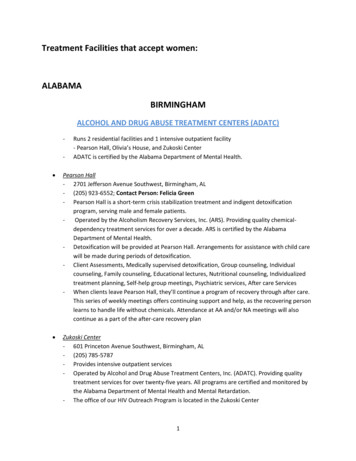
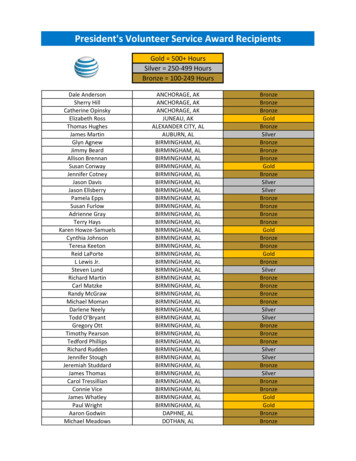
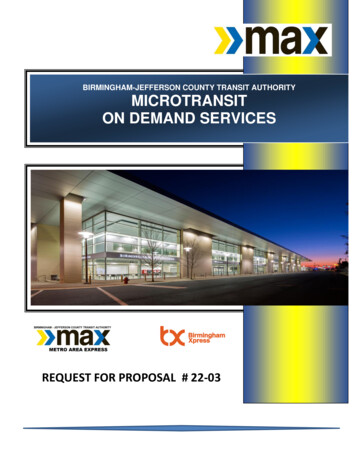
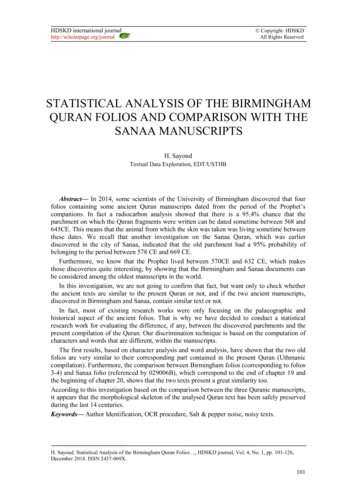

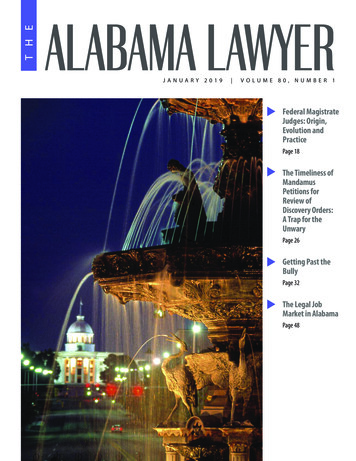
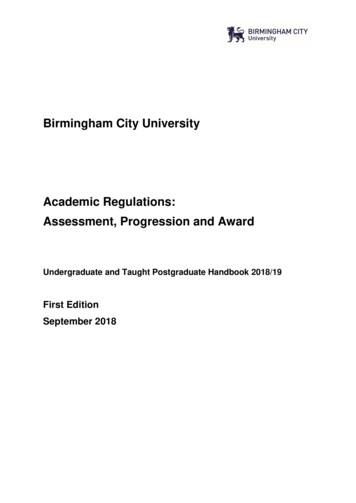

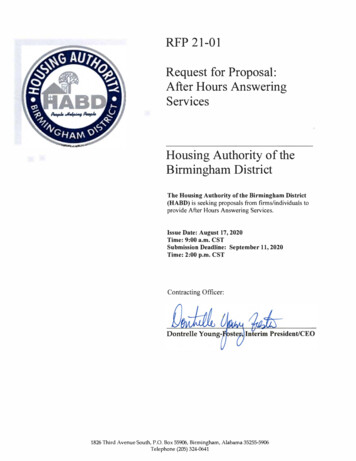
![Letter from Birmingham Jail (1963) [Abridged]](/img/2/1963-mlk-letter-abridged.jpg)